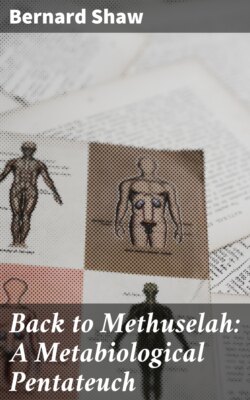Читать книгу Back to Methuselah: A Metabiological Pentateuch - Bernard Shaw - Страница 31
На сайте Литреса книга снята с продажи.
HOW WE RUSHED DOWN A STEEP PLACE
ОглавлениеTable of Contents
Not so the rest of us intellectuals. We all began going to the devil with the utmost cheerfulness. Everyone who had a mind to change, changed it. Only Samuel Butler, on whom Darwin had acted homeopathically, reacted against him furiously; ran up the Lamarckian flag to the top-gallant peak; declared with penetrating accuracy that Darwin had 'banished mind from the universe'; and even attacked Darwin's personal character, unable to bear the fact that the author of so abhorrent a doctrine was an amiable and upright man. Nobody would listen to him. He was so completely submerged by the flowing tide of Darwinism that when Darwin wanted to clear up the misunderstanding on which Butler was basing his personal attacks, Darwin's friends, very foolishly and snobbishly, persuaded him that Butler was too ill-conditioned and negligible to be answered. That they could not recognize in Butler a man of genius mattered little: what did matter was that they could not understand the provocation under which he was raging. They actually regarded the banishment of mind from the universe as a glorious enlightenment and emancipation for which he was ignorantly ungrateful. Even now, when Butler's eminence is unchallenged, and his biographer, Mr. Festing Jones, is enjoying a vogue like that of Boswell or Lockhart, his memoirs shew him rather as a shocking example of the bad controversial manners of our country parsonages than as a prophet who tried to head us back when we were gaily dancing to our damnation across the rainbow bridge which Darwinism had thrown over the gulf which separates life and hope from death and despair. We were intellectually intoxicated with the idea that the world could make itself without design, purpose, skill, or intelligence: in short, without life. We completely overlooked the difference between the modification of species by adaptation to their environment and the appearance of new species: we just threw in the word 'variations' or the word 'sports' (fancy a man of science talking of an unknown factor as a sport instead of as x!) and left them to 'accumulate' and account for the difference between a cockatoo and a hippopotamus. Such phrases set us free to revel in demonstrating to the Vitalists and Bible worshippers that if we once admit the existence of any kind of force, however unintelligent, and stretch out the past to unlimited time for such force to operate accidentally in, that force may conceivably, by the action of Circumstantial Selection, produce a world in which every function has an organ perfectly adapted to perform it, and therefore presents every appearance of having been designed, like Paley's watch, by a conscious and intelligent artificer for the purpose. We took a perverse pleasure in arguing, without the least suspicion that we were reducing ourselves to absurdity, that all the books in the British Museum library might have been written word for word as they stand on the shelves if no human being had ever been conscious, just as the trees stand in the forest doing wonderful things without consciousness.
And the Darwinians went far beyond denying consciousness to trees. Weismann insisted that the chick breaks out of its eggshell automatically; that the butterfly, springing into the air to avoid the pounce of the lizard, 'does not wish to avoid death; knows nothing about death,' what has happened being simply that a flight instinct evolved by Circumstantial Selection reacts promptly to a visual impression produced by the lizard's movement. His proof is that the butterfly immediately settles again on the flower, and repeats the performance every time the lizard springs, thus shewing that it learns nothing from experience, and—Weismann concludes—is not conscious of what it does.
It should hardly have escaped so curious an observer that when the cat jumps up on the dinner table, and you put it down, it instantly jumps up again, and finally establishes its right to a place on the cloth by convincing you that if you put it down a hundred times it will jump up a hundred and one times; so that if you desire its company at dinner you can have it only on its own terms. If Weismann really thought that cats act thus without any consciousness or any purpose, immediate or ulterior, he must have known very little about cats. But a thoroughgoing Weismannite, if any such still survive from those mad days, would contend that I am not at present necessarily conscious of what I am doing; that my writing of these lines, and your reading of them, are effects of Circumstantial Selection; that I heed know no more about Darwinism than a butterfly knows of a lizard's appetite; and that the proof that I actually am doing it unconsciously is that as I have spent forty years in writing in this fashion without, as far as I can see, producing any visible effect on public opinion, I must be incapable of learning from experience, and am therefore a mere automaton. And the Weismannite demonstration of this would of course be an equally unconscious effect of Circumstantial Selection.
